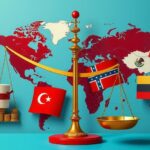Economy
Politics
AFRICA, ASIA, DONALD TRUMP, ECONOMICS, ECONOMY, EM, EUROPEAN COMMISSION, EUROPEAN UNION, HARARE, JAPAN, MNANGAGWA, NATIONAL SECURITY, NORTH AMERICA, REPUBLIC OF ZIMBABWE, TARIFFS, TRADE, TRUMP, U. S, UNITED STATES, UNITED STATES OF AMERICA, URSULA VON DER LEYEN, US, WASHINGTON, WHITE HOUSE ROSE GARDEN, ZIMBABWE
Omar El-Sharif
Mnangagwa Suspends Tariffs on U.S. Goods Following Trump’s New Duties
President Mnangagwa of Zimbabwe has suspended all tariffs on U.S. goods to strengthen trade ties after the U.S. imposed new tariffs on Zimbabwean exports. This decision aims to foster cooperation between Zimbabwe and the U.S. and reflects Zimbabwe’s commitment to amicable international relations. The suspension comes in light of an 18% duty imposed on Zimbabwean products by President Trump, which has drawn global criticism.
President Emmerson Mnangagwa announced the suspension of all tariffs on goods imported from the United States. This decision aims to strengthen bilateral trade ties following new tariffs imposed by the U.S. on Zimbabwean products. Mnangagwa stated that this move is a step towards promoting cooperation with Washington and enhancing trade relations between the two nations.
In his statement on the platform X, Mnangagwa highlighted the importance of reciprocal tariffs, which serve as a measure to protect domestic employment and industries. However, he affirmed Zimbabwe’s commitment to fostering amicable relationships with all nations without cultivating adversarial ties. He expressed that the suspension of tariffs reflects Zimbabwe’s dedication to achieving equitable trade while advancing bilateral cooperation with the United States.
This announcement came shortly after President Donald Trump revealed a new tariff structure, which includes an 18% duty on Zimbabwean exports. The tariffs are part of a broader plan that imposes a 10% base rate on most imports, along with significantly higher rates for select countries. Zimbabwean exports to the U.S., primarily consisting of sugar, tobacco, and ferroalloys, face challenges due to these high tariffs.
Trade between Zimbabwe and the United States, although modest, may be adversely affected by the new tariffs, particularly as Zimbabwean tobacco products already encounter substantial tariffs and excise duties in the U.S. Trump’s reciprocal tariff measures have attracted criticism from other global leaders, with European Commission President Ursula von der Leyen warning of potential harm to the global economy.
Despite the criticism, Trump defended his approach, describing it as necessary to reclaim lost economic advantages. The new base tariff set to take effect on April 5, 2024, will include specific rates for particular countries starting on April 9, with notable exemptions for essential goods not available domestically in the U.S. Mnangagwa’s administration expresses hope that the tariff suspension will pave the way for constructive dialogue and reduce tensions related to trade issues.
In conclusion, President Emmerson Mnangagwa’s decision to suspend tariffs on U.S. goods represents a strategic effort to enhance trade relations following the introduction of new tariffs by the Trump administration. The move aims to foster bilateral cooperation, with Mnangagwa emphasizing Zimbabwe’s commitment to maintaining friendly international relations. As concerns about the potential economic impact of the U.S. tariffs grow, Zimbabwe seeks to engage positively in trade discussions, hoping to mitigate escalating tensions and bolster its exports.
Original Source: www.zimlive.com








Post Comment